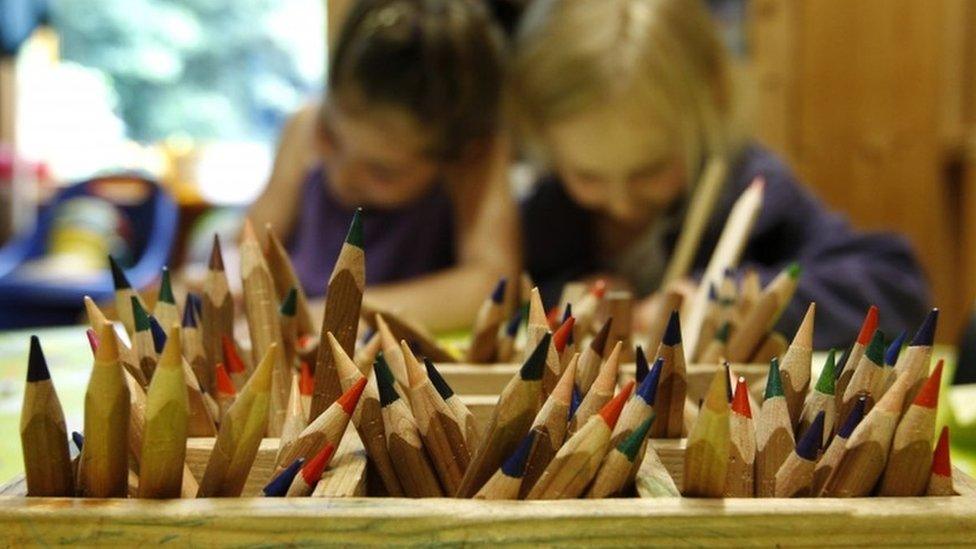Nurseries afraid to put up fees, says report
- Published

Staff costs form a large part of nursery outlay
Nurseries have resisted fee hikes for the first time in eight years, amid fears they will price parents out of the market, a report claims.
Average prices rose by inflation only, as providers in Britain realised they had reached a "crunch point", the Family and Childcare Trust report says.
Education and Childcare Minister Sam Gyimah said government investment had boosted access to affordable childcare.
But the author warns the fees "freeze" is not sustainable in the long term.
The report says government reforms to wages and pensions will raise the staff bill and contribute to financial pressures on childcare providers in the near future.
And new funding arrangements for free early education are failing to meet the full cost in some areas, forcing childcare providers to raise the amount they charge for additional hours, says the report.
The 2016 Childcare Survey for the charity, based on responses from 197 local authorities in England, Wales and Scotland, found the price of sending a child under two to nursery part-time (25 hours) is now £116.77 per week, or £6,072 per year.
This is a 1.1% rise since 2015 and compares with much steeper rises over the previous seven years.
Since 2008, nursery fees for under-twos have increased by 48.6% and 51.8% for over-twos.
'Pushed out'
Report author Jill Rutter said: "Bearing in mind the massive price increases of the past few years, providers have now realised that if they increase prices any more then they will be pushing parents out of the market and that they simply won't have a market.
"If they push prices up this year they will drive away their customers. It's a real crunch point for nursery funding."
She said nurseries were able to act in this way this year because providers' costs had not risen much.
Their key items of expenditure - staffing, food and equipment, had not increased, but she warned that this situation was unlikely to last, and that funding issues would be amplified when children's free entitlement is extended in England from 15 to 30 hours a week.
From April 2017, the government will increase the grant it pays to local authorities to fund the scheme for three and four-year-olds to £4.88 per hour.
But the Family and Childcare Trust says this often falls short and childcare settings often ask parents to pay much higher rates per extra hour over the free entitlement to make up the shortfall.
The report also warned that an estimated 40,000 three-year-olds were not taking up their free places in England.
It said: "There are still 36 local authorities where at least one-in-10 three-year-old children are missing out on free early education."
'Legal right'
"Many of the three-year-olds who do not receive early education come from disadvantaged families. If they do not receive early education, these children are likely to be further disadvantaged when they start school.
"The Family and Childcare Trust believes the government must address the low uptake of free early education among three-year-olds as an immediate priority."
It is calling for the free place entitlement to be made a legal right and for nurseries to be subject to an admissions code.

Mr Gyimah described access to high-quality affordable childcare as "vital"
Mr Gyimah said there was record support available to help parents access "vital", high-quality childcare, with rising numbers of places on offer.
"Thanks to record investment by this government, £6bn a year by 2020, and with our plan to double the free childcare offer for working parents we expect take-up numbers to rise."
In Wales, all three and four-year-olds are entitled to a minimum of 10 hours of free foundation phase early education.
In Scotland, three and four-year-olds are eligible for 600 hours of free childcare a year (the equivalent of around 16 hours a week during term time).
In Northern Ireland, under the pre-school education programme, there is an allocation of funded places for children in the year before they start school.
- Published17 February 2016

- Published26 November 2015
